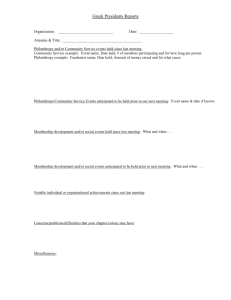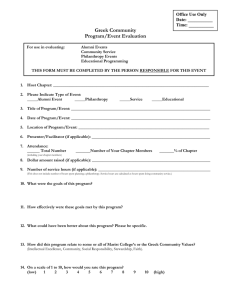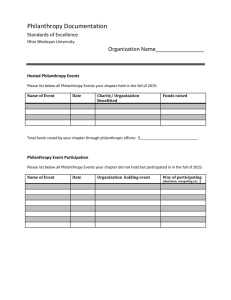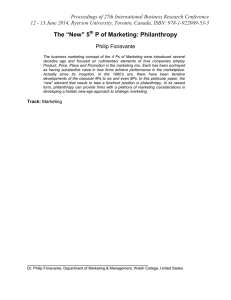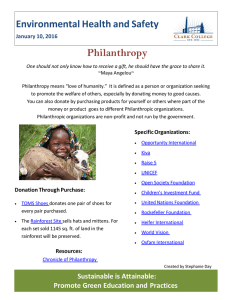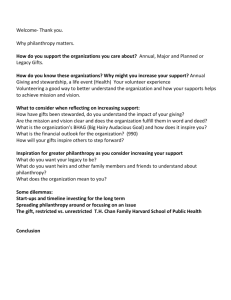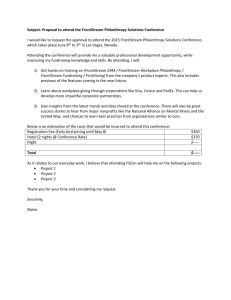Document 15640010
advertisement
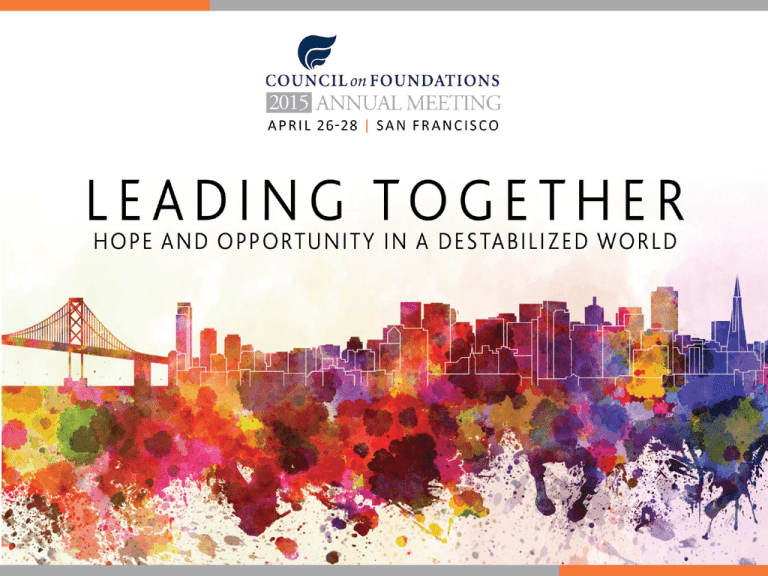
#COFAnnual Preparing Your Preparing Your Conference Session: Conference Session: How to Guide & Resources How to Guide & Resources #Philanthropy #COFAnnual Purpose of This Deck In order to maximize the collective impact of our sessions, we are providing this guide to help: • Organize your session • Ensure its interactive components • Create connections and therefore cohesion with other sessions • Connect your content to the conference theme • Generate resources proactively to support the sessions as well as create a learning community and exchange Preparing Your Conference Session: How to Guide & Resources #Philanthropy #COFAnnual #Philanthropy “How to Guide” Components WHAT DESCRIPTION WHY I. Desired Outcomes Overall Goals for Your Session Helps frame and keep presentation on track when creating the tactical design Preparing Your Conference Session: How to Guide & Resources II. Tie to Conference Theme: The Role of Philanthropy in a Fractured Nation As the theme of our conference, how does your session reflect this theme? How do you tie your desired outcomes to this theme? Creates cohesion for the overall conference as well as serves as a great way to frame individual sessions III. Agenda Clearly sequenced and timed outline of the exact flow of your session Ensures effective delivery of desired outcomes and serves as road map for team IV. Session Format & Logistic Requirements Session Format: This is the how of your session. What methodologies will you use ensure audience engagement and participation. Logistic Requirements: Submitting bios, photos, AV/Room Format Request, and any other logistical needs Adult learning requires us to use multiple methods and techniques to engage our audiences V. Visual Learning The supplementary role of visuals make the case for your content. Additional supports that are visual reinforce learning as well as respect diverse learning styles VI. Technology What are the opportunities to engage your audience with social media tools These new tools provide an opportunity to expand the tools traditionally available to use as “formats” III. Resources and Materials Submission of your supplementary materials that generate greater depth and understanding for your topic and session Furthers the engagement and understanding of the subject matter of your audience #COFAnnual #Philanthropy I. Desired Outcomes • Definition: overall goals of your session • What do you want participants to be talking about? Preparing • What are the knowledge, skills Your and attitudes you expect participants to possess by the end of your session? Conference Session: • What is the actual weighting of each of these types of outcomes for your session? What is your balance? How to Guide & Resources • How do your desired outcomes tie to the conference theme? • What is the tone that you would like to set? #COFAnnual #Philanthropy Example – Developing Desired Outcomes KNOWLEDGE SKILLS ATTITUDES By the end of your session, what do you want participants to know? By the end of your session, what skills do you want your participants to possess? By the end of your session, what attitudes or beliefs do you want participants to have? Example: New ways to engage younger family members in their family philanthropy Example: A new approach to host a learning session that effectively engages family members Example: Excited and motivated to try out new ways to engage their family members Preparing Your Conference Session: How to Guide & Resources #COFAnnual #Philanthropy II. Tie to Conference Theme • • The philanthropic community is coming together to address some of today's toughest challenges. The Council on Foundations' Annual Meeting brings together global leaders from across philanthropy to develop the ideas and strategies that will shape the future. Preparing Your Conference Session: Our meeting theme, “Leading Together: Hope and Opportunity in a Destabilized World” invites philanthropic leaders to collaborate more How to Guide & Resources effectively for greater social impact. If philanthropy can help stabilize critical areas and issues, we can thereby create greater stabilization around the world. #COFAnnual #Philanthropy Different Types of Conference Sessions • At the conference, session types include: • 90 Minute Workshop Sessions: Interactive, compelling, relevant and practical; allows time for participants to process and reflect on how learning applies to their own work • Plenary: Thought provoking, inspirational sessions for all (or most of) of conference participants • General Sessions: High level, focused content that frames an issue building on historic context and lessons learned • Off Site Sessions: Experiential learning that showcases the region Preparing Your Conference Session: How to Guide & Resources #COFAnnual #Philanthropy Session Format Options Session Format Description Point/Counter Point These sessions feature opposing points of view, with protagonists and antagonists taking opposite sides of a specific topic. A moderator facilitates a lively debate. Ignite Knowledge Fair Role Playing Preparing Your Conference Session: How to Guide & Resources Participants have five minutes to speak about their ideas and personal or professional passions using 20 slides. Each slide is displayed for 15 seconds and automatically advanced. The presentations are meant to "ignite" the audience on a subject, that is, generate awareness and stimulate thought and action. Knowledge fairs are face-to-face events in which participants set up displays to share their topics. Fairs are free-flowing, open, flexible, and non-hierarchical. People can see what is happening and what others are doing, and can interact with each other. Events mix different levels and types of people in a variety of interactions. These sessions are organized around short skits that illustrate a point. Role play can help participants understand different viewpoints and practice strategies in conversation and conflict management. #COFAnnual #Philanthropy Session Format Options Con’t Session Format Description Strategy Session The moderator or presenter poses a group of questions and then breaks the audience into small groups to answer a specific question. Groups then report back. Fish Bowl Preparing Your Conference Session: How to Guide & Resources Panel Discussion Fishbowl sessions involve five to eight people seated in a circle, having a conversation in full view of a larger group of listeners. The fishbowl provides a creative way to include the public in a small-group discussion. Fishbowls are useful for airing hot topics or sharing information from a variety of perspectives. Sometimes the discussion is limited to a specific group. Three or four speakers, led by a moderator, address a group. This format generally consists of 25 minutes for speaker comments and moderator questions, and 25 minutes for questions from the audience. For most conference participants, this is the least engaging method of learning. #COFAnnual #Philanthropy How To Engage Your Audience At the beginning of your session, just as you introduce your speakers, take the chance to learn about your audience You can engage them by: Coming up with five statements that would help get at who is in the room (years of experience, familiarity with the issue, type of organization, board vs. staff role, etc.) and ask people to raise their hands according to their answer Ask a few people to share their goals or expectations for the session Ask a few people to put out any questions they hope to have answered Come up with a couple of questions people can ask each other, one-on-one, in 1- to 2-minute chats; then go around the room to capture a few of these Preparing Your Conference Session: How to Guide & Resources #COFAnnual #Philanthropy Mini Session Format Ideas Pair Share: have participants talk to their neighbor as a way to introduce a concept, discuss a concept that was presented or begin the process of “taking it home” Silent Reflection: allows participants to process material or formulate questions they may have; honors different learning styles in any room Quick Quiz: pose a question that you want the group to ponder and serves as a “silent brainstorm;” can then be used to share back to the large group or as a part of a pair share Preparing Your Conference Session: How to Guide & Resources #COFAnnual YOUR WORKSHEET Agenda WHEN WHAT 5-10% Opening • Welcome • Quick Agenda Review • Getting to Know Your Audience • Connection to Vision to Action theme • Quick Speaker Intros 10-30% 40-70% 5-10% HOW WHO NOTES Session Facilitator Preparing Your Conference Session: How to Guide & Resources Presentation Interaction Closing • Recap of Major Points • Thank Speakers and Participants • Evaluation Session Facilitator #Philanthropy #COFAnnual #Philanthropy V. Visual Learning • Grounds content Preparing Your • Increases audience’s attention • AddingConference graphs, pictures orSession: diagrams for visual representation of the content provided are the most commonly used techniques How to Guide & Resources #COFAnnual #Philanthropy Visual Learning Techniques TECHNIQUE DESCRIPTION WHEN TO USE Charting information Have a dedicated recorder who is capturing main ideas as they being presented Low tech but effective; importance of basics to ensure its efficacy Powerpoint/Prezi Shared single point of easy to follow and read content; COF template provided for your use Lots of content that is being shared, can hit the highlights, also very good for graphs, charts; remember less is more on any page Great way to show concept in action or provide inspiration for content; anchor point or kick off emotion or topic in a powerful way Can be used at any point of presentation— need to think about its power to succinctly convey information—when will this best serve you? Note: doesn’t have to be content you have created—just has convey message you are trying to get across Since the conference this year is striving to be more environmentally friendly, we prefer that you post a link to the files (vs. printing hard copies) – See Section VIII for instructions on how to share resources When you have lots of content and don’t want participants focused on note taking, supplementary support—can you deliver via tablet or other non paper application (see Technology Section for more ideas) Video/Photographs Handouts Preparing Your Conference Session: How to Guide & Resources #COFAnnual #Philanthropy How Technology Can Enhance Your Session TECHNOLOGY DESCRIPTION WHEN IS BEST USED Council on Twitter Fall Conference #: #COFAnnual #Philanthropy 15,300 people follow the Council on Twitter Advertise content of your session Share highlights from session To learn more about the topic post session Facebook 2,448“Likes” Ask questions, post news, or weigh in on issues 30,000 unique visitors to the blog; for this format you can have up to 300 words, with a thought provoking question as a close Great way to keep dialogue going and keep others connected to the topic Preparing Your Conference Session: How to Guide & Resources Philanthropy Exchange #COFAnnual #Philanthropy VI. Technology: A New Dimension • We have moved in a three dimensional way beyond PowerPoint and poster paper to share information Preparing Your • The technologies are new and constantly being enhancedConference Session: • It’s often hard toGuide discern what does (or doesn’t) How to & Resources make sense to leverage in this field • The frame of maximizing learning needs to be kept at the forefront of your analysis when determining what you want to include #COFAnnual VII. Resources Your session has even greater strength when there are further resources that support it. Your assigned coach will be requesting these resources from you so that they can be shared with conference participants. Also, should you use PowerPoint, we are providing a template for your use. RESOURCE Articles Websites Videos Blogs Preparing Your Conference Session: How to Guide & Resources Other Thought Leaders Materials Used in Your Session NAME/LOCATION #Philanthropy
